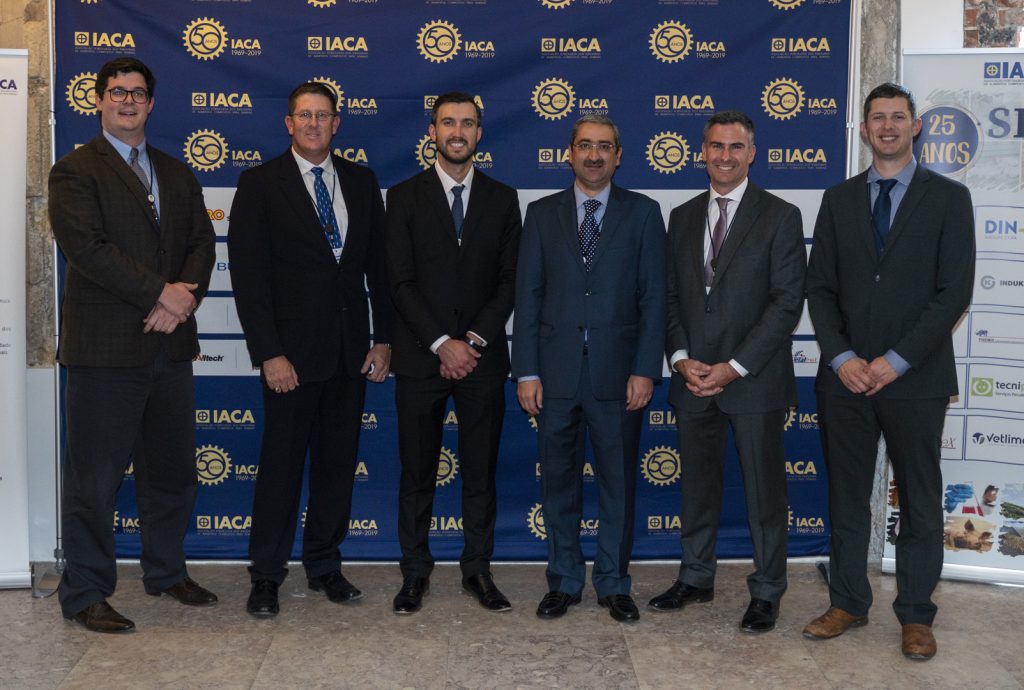With six members along to share their expertise, the U.S. Grains Council (USGC) conducted a robust, week-long roadshow through Spain and Portugal in October to promote U.S. sorghum and containerized dried distiller’s grains with solubles (DDGS) to key importers and trading companies involved in the Spanish and Portuguese feed industries.
“Each one of these conferences was strategically located so that the team could get an opportunity to see the market in its entirety and forge valuable connections along the way,” said Reece Cannady, USGC manager of global trade, who led the delegation. “Spain has continued to purchase sorghum and DDGS from the United States and these meetings built on the Council’s positive momentum in the market by connecting potential business partners and learning more about their capabilities.”
Spain is a top market for U.S. coarse grains and co-products in Europe, importing more than 800,000 metric tons of U.S. sorghum and DDGS in the 2018/2019 marketing year in addition to sales of U.S. corn and ethanol in the new marketing year.
The Council started Monday, Oct. 19, in Madrid, by hosting a half-day conference at which U.S. exporters had ample time to network and better understand potential opportunities in Spain. Agricultural production on the Iberian Peninsula is suffering from a drought this year, resulting in upwards of 17 million metric tons of animal feed grains needed from other sources, including the United States. U.S. sorghum is an attractive alternative with duty-free access to the market and no biotechology concerns. Spanish nutritionists have also been evaluating the efficacy of DDGS for livestock production as well.
On Tuesday, the team conducted a similar conference with stakeholders in Cartagena on Spain’s southern coast, finding significant opportunities for containerized DDGS shipments because of favorable port infrastructure and freight rates.
“Southern Spain is likely the greatest point of entry today for containers with the most amount of interest from importers,” Cannady said. “It was good that the team was able to meet with importers in the region to capitalize on the short-term market potential and establish business relationships that will last for many years.”
On Wednesday, the team visited with port owners, importers and the port authority in La Coruña, on Spain’s northwestern coast, to evaluate the logistical system into the port.
“La Coruña is truly a beautiful port with great capacity,” Cannady said. “The port has great infrastructure to handle bulk vessels. You will see a lot of bulk imports come in through La Coruña.”
The team kept up their pace on Thursday, traveling to Seville, on Spain’s southwestern coast, to participate in a networking event with local importers and brokerage firms. Seville was another bright spot for potential container trade, again due to infrastructure and favorable freight rates in addition to buyers’ willingness to take advantage of market savings.
Friday found the team in Lisbon, Portugal, where they attended the 50th anniversary gala dinner for the Portuguese animal feed association. With more than 200 in attendance, the team was able to meet with key stakeholders in the Portuguese feed industry. Because the Portuguese industry relies on Spanish barley, the drought also affects this market. As a result, Portugal will likely import more feedstocks from other origins this year, including from the United States.
“The Council is developing strong ties with the industry, importers, government officials and livestock producers in Spain and Portugal,” Cannady said. “We will continue to work closely with the major players in the Iberian Peninsula to maintain these relationships, improve imports of U.S. sorghum and DDGS and develop prospects for demand growth.”
About The U.S. Grains Council
The U.S. Grains Council develops export markets for U.S. barley, corn, sorghum and related products including distiller’s dried grains with solubles (DDGS) and ethanol. With full-time presence in 28 locations, the Council operates programs in more than 50 countries and the European Union. The Council believes exports are vital to global economic development and to U.S. agriculture’s profitability. Detailed information about the Council and its programs is online at www.grains.org.


